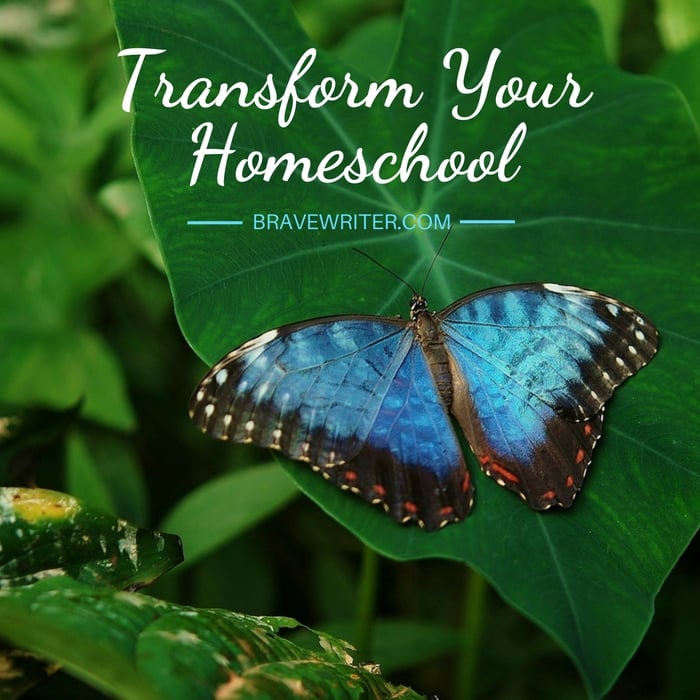
Do you have curriculum on the brain? Is there one child you worry is not progressing like he should? Are you adamant inside that you will NOT neglect that one subject area like you did last year (you know, science, for example!)? Do you worry that you’ll be bored and can’t figure out what to do about that?
I remember when I was home educating my five kids, July felt like the last bell. I had to figure it out by August! Panic set in and I spent hours evaluating curriculum, talking online, calling friends, paging through catalogs… You know the drill.
Have you asked yourself this question, though?
Is curricula the key to fulfillment at home with my kids—the experience of success, progress, and good memories?
What if it’s not? What if you’re missing the main ingredient for a successful year with your kids and it can’t be purchased or shipped or researched?
Years ago, when I was in between a June and an August, I realized that I wished I knew how I could plan a year that would end with smarter kids, and me—happy and relieved, not exhausted, and worried. Ever felt like that?
We talk about how much we love homeschooling (really, most of us do!), but we also spend an equal amount of time:
worrying,
fretting,
planning,
revising,
ditching one book for another,
cycling back to the ditched program,
ditching it again, and so on.
We go from:
schedules to unschooling,
plans to inspiration,
child-led to parent-controlled,
workbooks to unit studies,
DVD instruction to co-ops,
looking for that perfect blend of instruction that leads to brighter kids, good feelings, and a clean kitchen to boot!
It’s so easy to doubt yourself when you home educate. You never know if you’ve got just the right combination of elements to sustain the joyful peaceful progress-creating home you imagined when you started.
The following tips are meant to help you off the hamster wheel of schedules and plans, and into the deeper space inside that helps you calibrate the mood and tone of your home.
3 Tips to Transform Your Homeschool

1. See the end from the beginning.
Ask yourself in August how you will know you’ve been successful when you get to June. Pretend you are looking back on the coming year, not looking forward. What is the measurement you use to evaluate your home education experience?
Write it down!
It might be: Noah will have mastered the times tables and read 5 books on his own.
Or it could be: I’ll feel happy and relaxed at the end of the year.
Or it might be: My kids will have memories of concrete outings.
Or you might even think: I’ll know it was a good year if we complete three projects together that I can hold in my hands and share with someone else.
Note that each one of these examples is different in character. The first is specific to the child. Perhaps this is the year where one child needs to have a clear objective and you target that over everything else.
The second has to do with YOUR well-being. See that? You may like your homeschool routine and program, but you live from a space of anxiety and nerves. This year, your goal will be to create a routine that takes care of YOU so you don’t burden your kids with your micromanagement, or your hyper control, or your moodiness. If you get to the end of the year and feel good about yourself, regardless of how the schooling went, that will mean you hit your target!
The third might mean you must put a schedule into place. Take a day to plan several outings for the year and get them on the calendar so they really happen. Then do them! Know that if you get them done, you’ve hit your mark. Drink that in. Happiness at home is a group of satisfying experiences, not daily drudgery. A little goes a long way.
The last requires research and scheduling too, but also preparation. You want to have the materials on hand, the months picked out in advance, the projects lined up. You will want to know that projects sometimes obliterate other home education goals (like completing workbooks). You let yourself be okay with that by making the projects a priority.
These are four examples, but your needs may (and will likely) vary. The point here is that you must think ahead to your insides (your feeling-place) and then accept what comes. Your secret needs assert themselves whether you want them to or not, and these are different than your plans and goals.
Plans and goals are the execution tactics
you use to home educate.
You determine that you want to move a 10 year old through 4th grade materials in five subjects. Then you assemble the curricula, you map out (however tightly or loosely) a strategy for working through those books and ideas or projects. You target an end date. Done.
But that’s NOT what I’m talking about. Life intervenes and you rarely get through your plans successfully in a year for all 4 or 6 kids. Seriously.
I mean, if you plan one writing project per month per writing child (and let’s say you have 4 writers in your crew), that’s 40 writing projects to produce in one school year (10 per school year per child).
NO ONE GETS 40 WRITING PROJECTS DONE IN A YEAR.
So you are doomed before you even start, yet your plan looks perfectly reasonable.
The secret need underneath the plans and goals is the one we want to identify. Fulfilling the secret need is what lets YOU know that you’re doing a good enough job and that you’re using your resources, time, and energies wisely. You can’t see the end from the beginning until you know what your secret needs are.

2. Identify the secret need.
I’ll give you a hint: Do NOT focus on plans. Instead, look back at last year and say to yourself—
“What makes me sad about last year?” (Or insert any emotion—”What makes me wistful, or angry, or worried, or upset, or frustrated, or happy, or proud?”)
If the answer is something like:
“The House! It drives me bananas. I can never find the books we need when we need them, there are no sharpened pencils, and the kitchen table is covered in mail and left over cereal bowls.”
You now know—a clear, deep, felt need is to have control over your stuff and your environment. It doesn’t SEEM like it has anything to do with home education, but in fact, it may be the difference between your sanity and your kids’ progress in math! As a friend of 7 kids told me, her adult children joked that one year, one of her children couldn’t find her math book for an ENTIRE YEAR and the mom never knew it. That’s not good!
If you have some happy memories but they are few, it might be worth it to ask yourself what you were doing in those moments that worked! That discovery may help you figure out your secret need. For example, maybe starting the day with copywork first thing after breakfast was the perfect solution to getting everyone into the mindset of shared learning.
Maybe poetry teatimes were the perfect antidote to too many workbooks and you found that you were more in love with your children on Tuesdays than Thursdays. How can you get more of that joy into your homeschool? Ask yourself.
Your secret need helps you to determine where to put
your strategic and emotional energy this year.
Here are some secret needs you might want to consider to prompt yours to come up from the depths. The need for:
- order (if you feel you live in chaos)
- support (friends, spouse, community, accountability)
- happiness (no tears, laughter, energy around family activity)
- balance (between project-y activities and daily predictable routine)
- appreciation (someone else affirms what you do and gives you the praise you deserve)
- measurable accomplishments (when most days feel like you’re a hamster on a wheel and you can’t see progress)
- fun (laughter, activities, surprises, family outings or games)
Keep brainstorming. It’s so easy to knuckle down on our kids when we feel frustrated, lonely, tired, worried, or thwarted. You will know your secret need when you suddenly run into it like a red brick wall—
I’m so frustrated!! or
I’m so done with homeschool!! or
If I could just get out of this house (or get everyone else out!) for 3 hours, I’d be okay!!
Once you know your secret need, address it. Pick one way you can work on that one need (don’t tackle six or sixteen secret needs). You need to be able to create a concrete strategy for how to meet it.But there’s one more component you must address as you plan this next year. Not just seeing the end from the beginning or knowing what your secret needs are is enough. There is one more factor to take into consideration.

3. Remember that other people have goals and needs too.
So many women would be perfectly fine in their homes if it weren’t for…. fill in the blank—
- their spouse,
- school teacher mother-in-law,
- homeschool discussion forum community with its endless advice and suggestions to reconsider everything with the miracle product,
- their whiny kid,
- the best friend home educator who does it all effortlessly and bakes bread from scratch, too,
- their college degree reminding them that they’re not using it,
- the books they read about learning.
If you find that you doubt yourself regularly, identify where those voices come from. Is it the “ghost-of-public-school-past” on your left shoulder, whispering in your ear, reminding you of what you did in school that you aren’t doing with your kids?
Is it your husband who asks what you did all day and hopes you show him pages of words and equations, not dress-up clothes and sidewalk chalk?
Is it your best friend who doesn’t say a word, but whose happiness and success is obvious to you and you don’t know how to achieve it?
Is it one of your children who has told you she hates school even though you’ve worked so hard to make it a happy space for her?
No matter how clear your goals, no matter how accurately you identify your secret needs, if you don’t silence the nay-saying voice(s) in your life, you will never feel successful to the degree that you want to.
You need to know two things:
- You can’t make everyone happy, particularly those outside your family.
- Conversely, it helps to listen to your family members and provide one or two ways for them to be happy, even if they want things you don’t typically want or find difficult to do.
For instance: If you feel burdened by endless curriculum discussion online, yet love the support of those communities, find other places to converse where curricula isn’t the central focus. Be brutally honest here. It’s so easy to get lost in hours of conversation that ultimately leads to your perennial dissatisfaction. Don’t get sucked in!
Get that social need met differently so you don’t keep swapping out homeschool materials that are already working just to satisfy some itch for social connection online. Being an expert in curriculum might actually undermine your ability to use it (more time spent talking about it than enjoying it!).
On the other hand, if you have a spouse who is nervous or worried about home education, you will want to incorporate some of his secret needs into your plans so you are both happy at the end of the year. Work through these same 3 steps with him, over coffee. Get on the same page. Let him know that you want to be a team.
To be happy at home, everyone needs to buy in
and feel they have a chance at feeling peaceful.
If you have a frustrated kid or two, it’s nice to ask your children what they would like to do this year that would send them over the moon into joy! What are their big aspirations and hopes? How can you make those come true? At least on some scale? (I’ll write more about this in an upcoming email/blog post.)
The point is this: Don’t forget to plan how you will feel this year, not just what you will do.
If you forget to take your real needs and feelings into account (and if you forget to check in with yourself and your family throughout the year), you will plan for emotional exhaustion and dissatisfaction which is never how any of us wants to remember a year of homeschool.






















